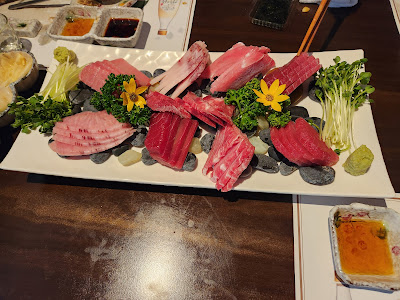Seafood, Risky hobby to seek?
Now,
everybody seems to talk about frozen-kimbap, but I am not talking about it for
now and I am talking about release of allegedly toxic water from Fukushima plant.
Because I am
more often seek dishes made of marine products than street foods and much concerned about
what’s going on at sea. Since this country is bordered with seas on three
sides, marine products play an important role in Korea's food culture, and
interest in the safety of marine products is also increasing amid the
increasing consumption of marine products by the Korean people.
Japan
announced plans to release radioactive contaminated water into the sea from
2023. What’s going on there may have direct consequence here, so many talk about
the safety of having seafood dishes. Therefore, it is necessary to analyze
changes in the perception and impact of marine product consumers due to radioactive
water discharge, and many so-called experts in this field conducted studies. One
of those study analyzed the status of radioactive contaminated water emissions
in Japan, and showed a survey result consumer’s perception on seafoods. According to the survey, 85.3% of the
respondents said that if Japan discharge contaminated water from nuclear power
plants, it will affect the purchase of domestic marine products, and 85.5% said
it will affect the purchase of imported marine products.
Well, this was
a pre-release opinion poll and now let’s see what happened since then.
Since the
24th of last month (august 2023), Japan has released Fukushima contaminated
water, raising worries that marine product consumption will drop sharply in
Korea. This is because there is a precedent for a decrease in marine product
consumption in 2011, when the Fukushima nuclear accident occurred, and in 2013,
when the Japanese government admitted to leaking contaminated water.
The industry
believes that the number of people looking for Chuseok seafood gift sets has
increased from last year because they consist of pre-stocked supplies before
the release. An industry official said, "Consumers do not seem to be
reluctant to purchase them as gifts, given that this Chuseok supplies have not
been affected by the discharge of contaminated water."
The decision
to implement measures to strengthen the safety of fisheries products separately
by each company also seem to contributed to lowering consumers' anxiety. As
companies have even stockpiled new year's gift sets for next year's Lunar New
Year, they plan to actively inform them so that they do not lead to a
contraction in consumption.
Meanwhile,
gift sets ranging from 200,000 won to 300,000 won are selling well at
department stores. This is due to the government's recent revision of the
Enforcement Decree of the Anti-Solicitation Act (also known as the Kim
Young-ran Act) to raise the maximum gift price of agricultural, livestock, and
fisheries products and their processed products from 200,000 won to 300,000
won.
Certainly, the media coverage cannot
be the end of the story on seafood consumption in Korea. It is a start and we
are not so sure if there will be happy ending to all related sectors and
gastronomical hobbyists like me. It is too early to say anything, but I think
we already live in the unsafe environments. Near shore industrial complexes all
around world have been discharging a large amount of carcinogen and other
contaminants. We have thought that Mother Earth’s Ocean is huge thus believed
in its buffering ability for long time. I wonder if the status quo of our
belief system will change.





Comments
Post a Comment